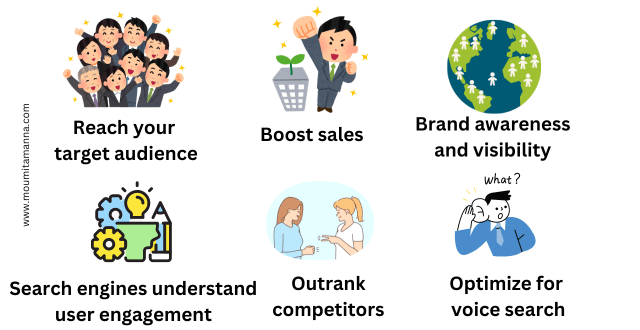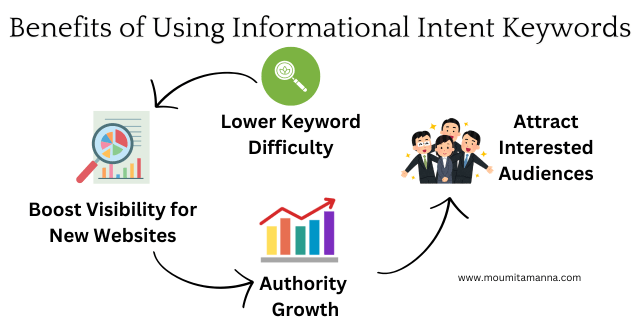Search intent is one of the most important factors when conducting keyword research for content writing. Targeting keywords that align with the search intent of your article is essential for ranking higher on the search engine results page (SERP). This helps maximize search traffic from organic searches and boosts user engagement.
Search intent reveals what users are looking for and the questions on their minds when they search for a keyword. Creating content that addresses all their queries and resolves their confusion by fulfilling their needs is known as search intent optimization.
Table of Contents
Definition of Keyword Search Intent
When users search for something on Google or another search engine, they are looking for specific answers or results that meet their needs. Understanding the purpose behind searching for a keyword is called search intent.
Example of Targeting Keywords with Search Intent
If a user searches for “Best Content Writer,” it means they are looking for an expert in content writing. Once you understand the user’s need, you can easily identify related keywords that may also be helpful.
Keywords with the same search intent include:
When a user searches for “Top Content Writer”, or “Best Freelance Content Writer” he is likely seeking information or looking to hire someone.
So, you can target those keywords with the same intent in a single post. However, if you include “how to become the best content writer” in the same content, the bounce rate will increase because the user’s intent does not match here. The user isn’t looking for that information.
Targeting the right keywords is crucial for improving engagement rates, which, in turn, helps your page rank higher.
Importance of Search Intent Optimization
SEO is more than just integrating keywords into content. Search engines are now sophisticated enough to understand the intent behind an article. If your article focuses on a different intent than your title suggests, it will fail to rank on the search engine results page (SERP).
8 Important Factors for Writing Articles with a Specific Search Intent
Satisfying users is the top priority of search engines. If your goal aligns with this, your page will rank higher also it is important to learn how to write SEO-friendly content.

- Search engines understand user engagement: They can tell if users are finding the answers they need or skipping to another page to get better results.
- Users get exactly what they’re searching for: This increases engagement rates, a key factor in SEO, and helps improve overall site performance.
- Reach your target audience: By creating content tailored to what users are searching for, you can better connect with your audience.
- Build brand awareness and visibility: Targeting search intent helps increase traffic and allows people to understand what your brand is all about.
- Boost sales and conversions: Targeting specific search intents can help businesses increase both sales and conversion rates.
- Outrank competitors: Writing informative content that meets users’ needs can help you rank higher than your competition.
- Optimize for voice search: With voice search trending, it’s important to target keywords that can appear in voice search results as well.
By focusing on search intent, you can create a more powerful content strategy that increases your domain authority.
4 Types of Search That Are Important to Know
Understanding the different types of search intent is crucial for creating an effective marketing strategy through content. There are mainly four types of searches people conduct on search engines, which are discussed in detail below:
Informational Intent (with an Example)
These searches are made to gain knowledge or information about a topic. Typically, this type of search begins with phrases like “how to,” “best way to,” or a question purely aimed at acquiring knowledge.
- Google can understand the user’s intent even if the keyword is slightly different.
- Now, Google has introduced “Search Labs,” an AI feature that directly shows a short answer at the top of the SERP. This AI feature provides exact answers for informational queries, but if a user wants more in-depth information, blog posts come into play.
For example, if a user searches for “how to grow indoor plants,” Google understands they are likely a beginner seeking knowledge, not someone intending to purchase indoor plants.
If you write a post titled “How to Grow Indoor Plants” but focus on a buying guide for plants, Google will not promote the page.
Top 4 Benefits of Using Informational Intent Keywords
When it comes to SEO, informational keywords are among the most important for building domain authority quickly. For new websites, targeting informational keywords is key to gaining visibility on search engine result pages (SERPs) more rapidly.

- Lower Keyword Difficulty: Informational keywords tend to have lower competition compared to other types of search intent keywords.
- Visibility for New Websites: For a new website, creating content with informational intent helps get noticed, even if the site has very few backlinks.
- Quick Domain Authority Growth: Targeting low-competition informational keywords can boost domain authority and help build trust faster.
- Attracting Interested Audiences: These keywords help attract people who want to learn more about your niche, increasing the likelihood of gradually converting them into customers.
Navigational Intent (with Example)
Navigational intent occurs when users have already decided to visit a specific website and search for it by typing the site name or a query that includes the site’s name.
Navigational intent is typically associated with well-known brands and websites, where users search directly by name.
For example, if you have a dog food brand and target navigational keywords like “Pedigree dog food,” you may attract people who love Pedigree and, in turn, could become interested in your brand. This can bring in high-quality traffic.
Benefits of Using Navigational Intent Keywords
Targeting these keywords can be beneficial if your website offers similar services, as there’s potential to capture high-quality traffic from users searching for well-known brands.
- Target a Brand’s Audience: You can target a particular brand’s audience by writing an article about that brand, increasing the chances of your content appearing when users search for it.
- Ensure Visibility for Your Brand: When people search for your brand online, optimizing for navigational keywords ensures your website appears, making it easier for them to find you.
- Capture High-Paying Traffic: By targeting premium brands in your niche, you can attract traffic with a higher purchasing capacity.
Commercial Search Intent Queries with Example
One of the most important types is commercial intent.
When a user decides to buy something but wants to research the product before purchasing, they perform a commercial intent search.
These queries typically start with words like “Best” or “Reviews.” Commercial intent keywords are more competitive than informational ones because they attract users with a buying mindset
For example, if someone searches for “Best Daily Planner Notebook,” it’s clear that they are planning to buy a notebook and are researching the best option.
Focusing on these types of queries is crucial for boosting e-commerce sales or generating revenue from affiliate sites.
Advantages of Using Commercial Intent Queries
These keywords attract people who are planning to make a purchase, making them important for boosting a website’s revenue.
- Promote Affiliate Products: These queries provide a high chance of users considering purchasing products promoted through affiliate marketing.
- Passive Promotion: You can passively promote your services while providing valuable information on commercial queries.
While targeting these queries has high earning potential, ranking for them is difficult because well-known brands and large e-commerce companies often dominate these keywords.
Transactional Intent of Users with Example
Transactional intent occurs when a user has already decided what to buy and is searching for that specific product to purchase immediately.
These queries usually consist of the product’s name. Targeting transactional keywords makes your page visible to users who are ready to buy. However, ranking for these keywords is challenging due to their high difficulty.
For example, if a user searches for “Buy Philips PowerPro Vacuum Cleaner,” it means they have decided to buy it or are in the final stage of the purchase process. For e-commerce businesses, transactional keywords are the most valuable and typically lead to the highest conversion rates.
Advantages of Using Transactional Keywords
Targeting these searches means you’re reaching users who are ready to make a purchase.
- Attract instant buyers.
- When users search for a product you sell, your website can appear, making it easier for customers to find and buy from you.

Where to Find a Content Writer Who Understands Keyword Search Intent – Moumita Manna
If you’re struggling to find a content writer who can create SEO-friendly articles for your website, you’re not alone. It can be challenging to find a writer with a deep understanding of targeting specific search intents and writing articles that rank higher. Contact us to hire a content writer today.
How to Match Content with Keyword Search Intent
If your content aligns with the user’s search intent, Google can recognize it by observing user behavior after they land on your article. Matching content to user intent is crucial for achieving higher rankings on search results.
Tips to Write Content That Matches Search Intent
Here are some tips to effectively target specific traffic based on user intent:
- Decide which type of user you want to attract with your post.
- Find a topic that your target audience is likely to search for.
- List all related keywords that could fulfill the user’s query.
- Write the post based on the primary intent of the keyword.
Get Quality Leads by Focusing on Search Intent
Understanding the type of people searching for your target keywords is essential for attracting quality leads.
For example, if you sell soap-making machines for factories and write an article titled “Benefits of Using Natural Soap,” it won’t attract quality leads.
Users searching for that title are likely concerned about beauty, not industrial soap-making equipment, even though the keyword “soap” is relevant to your business.
Why Keyword Intent Is Important for Building a Sales Funnel
When a user visits your website for the first time, they may take time to research before making a purchase. This is where the sales funnel comes into play, and by using search intent knowledge, you can convert traffic into quality leads.
Here are four steps to building a sales funnel using search intent:

- Give importance to the Informational Queries: Start your website journey with content that provides valuable information. Ranking for this type of content is easier.
- Build Trust: By ranking for informational content, your website will start gaining traffic and building trust with your audience.
- Drive Interest in Commercial Queries: Gradually link commercial queries to your informational posts to pique users’ interest in those topics.
- Convert Them into Customers: As users become convinced by reading your commercial content, they will eventually convert into customers, leading them to transactional intent pages
How to Audit Your Existing Content for Search Intent
There are two ways to audit the search intent of your existing content:
Manual Audit: Search your article’s title on Google and check which keywords are ranking. The top-ranking articles have high engagement rates. Analyzing these lets you better understand what users want and compare it to your article.
Use Keyword Research Tools: Various tools can help identify the search intent behind a keyword. These tools can provide insight into which keywords your content should target.
In a survey of nearly 3,890 SEO experts worldwide, most agreed that content strategy will be their top priority in the coming year. Writing strategic content is crucial for online growth and business success.
What is the Importance of Keyword Search Intent?
When users search for queries in search engines, they do so with a specific purpose. This different type of purpose of the user is called search intent. Understanding the search intent behind keywords is crucial for creating posts that match what users are looking for. This helps improve page rankings on Google.
Why Does Search Intent Matter in SEO?
In search engine optimization (SEO), search intent determines whether a post will engage the user by meeting their needs. Engagement rates are directly linked to SEO performance, making search intent a key factor in improving rankings.
